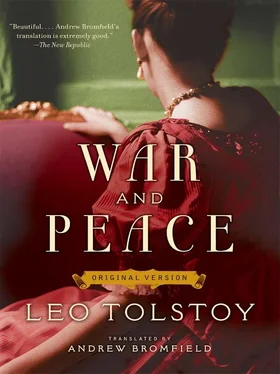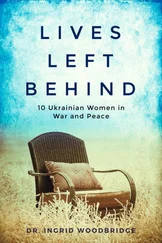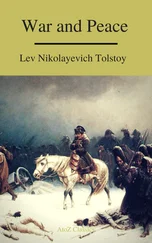“Very well, very well …”
Noticing Anna Mikhailovna and her son, Prince Vasily dismissed the doctor with a bow and approached them without speaking, but with an interrogatory air. The son was astonished to see the profound grief that was suddenly expressed in Princess Anna Mikhailovna’s eyes.
“Indeed, what distressing circumstances we are obliged to meet in, prince … Well, how is our dear invalid?” she said, disregarding the cold, insulting gaze directed at her and addressing the prince as her best friend, with whom she could share her woe. Prince Vasily looked in baffled enquiry, first at her, then at Boris. Boris bowed politely. Prince Vasily, making no response to the bow, turned back to Anna Mikhailovna and answered her question with a movement of the head and lips which signified the very worst prospect for the invalid.
“Surely not!” exclaimed Anna Mikhailovna. “Oh, that is terrible! The very idea is appalling … This is my son,” she added, indicating Boris. “He wished to thank you himself.”
Boris bowed politely once again.
“Believe me, prince, a mother’s heart will never forget what you have done for us.”
“I am glad to have been able to do something to please you, my dear Anna Mikhailovna,” said Prince Vasily, adjusting his jabot, expressing far greater self-importance with his gesture and tone of voice to his satisfied suppliant here in Moscow than he had managed in St. Petersburg, at Anna Scherer’s soirée.
“Try to serve well and be worthy,” he added, addressing Boris with severity. “I am so glad … Are you here on leave?” he enunciated in his impassive tone of voice.
“I am awaiting orders, your excellency, to take up my new posting,” Boris replied, betraying neither annoyance at the prince’s sharp tone nor a desire to engage in conversation, but speaking so calmly and coldly that the prince regarded him more closely.
“Do you live with your mother?”
“I live in the house of Countess Rostova,” said Boris and added, again coldly, “your excellency.”
He evidently said “your excellency” not so much in order to flatter the other man as to restrain him from familiarity.
“That is the Ilya Rostov who married Natalya Z.,” put in Anna Mikhailovna.
“I know, I know,” said Prince Vasily in his monotonous voice, with a typical Petersburgian’s contempt for everything Muscovite.
“I never could understand how Natalya could bring herself to marry that ill-bred bear of a man. A perfectly stupid and ridiculous individual. And a gambler into the bargain, so they say,” he said, thereby demonstrating that for all his contempt for Count Rostov and his like, and for all his important affairs of state, he was not above listening to the rumours of the town.
“But a very kind man, prince,” Anna Mikhailovna remarked, smiling with feeling, as though she were also aware that Count Rostov deserved such a low opinion, but was asking the prince to pity the poor old man.
“What do the doctors say?” the princess asked after a brief pause, once again with an expression of great sadness on her tearful face.
“There is not much hope,” said the prince.
“And I so much wanted to thank my uncle once more for all his kindnesses to me and Borya. He is his godson,” she added in a tone which suggested that this news ought to delight the prince highly.
Prince Vasily began thinking and frowned. Anna Mikhailovna realised that he was afraid of discovering in her a rival for Count Bezukhov’s inheritance. She hastened to reassure him.
“If it were not for my genuine love and devotion to my uncle,” she said, pronouncing the word with an especially casual confidence, “I know his character, noble and straightforward, but he has only the princesses here … They are still young.” She inclined her head and added in a whisper: “Has he fulfilled his final duty, prince? How precious those final minutes are! After all, things cannot get any worse, he must be made ready, if he is in such a bad way. We women, prince,” she said, smiling sweetly, “always know how to say these things. I must see him, no matter how painful it is for me, I am already accustomed to suffering.”
The prince had evidently understood what she was saying, and he had also understood, as he had at Anna Scherer’s soirée, that Anna Mikhailovna was not easily to be put off. “I fear that meeting might be too hard on him, dear Anna Mikhailovna,” he said. “Let us wait until the evening, the doctors have predicted a crisis.”
“But one must not wait, prince, at moments like this. Think, it concerns the salvation of his soul. Aah! The duty of a Christian is a terrible thing.” A door from the inner rooms opened and one of the princesses, the count’s nieces, emerged, with a beautiful, but cheerless, cold face and a long waist quite astonishingly out of proportion with her legs.
Prince Vasily turned to her.
“How is he?”
“Still the same. But now there’s all this noise,” said the princess, examining Anna Mikhailovna like a stranger.
“Ah, my dear, I did not recognise you,” Anna Mihailovna said with a glad smile, springing nimbly across to the count’s niece. “I have come to help you care for your uncle. I can well imagine how much you have suffered,” she added sympathetically, rolling her eyes upwards.
The princess did not even smile, but excused herself and went away. Anna Mikhailovna took off her gloves and, consolidating the gains she had made, settled down in an armchair, inviting Prince Vasily to sit beside her.
“Boris,” she said to her son with a smile. “I am going in to see the count … my uncle, and meanwhile you, my friend, go to see Pierre, and don’t forget to pass on the invitation from the Rostovs. They want him to come for dinner. He should not go though, I think,” she said, turning to the count.
“On the contrary,” said the prince, suddenly quite clearly out of sorts. “I should be glad if you would relieve me of that young fellow. He simply hangs about here. The count has not asked for him once.”
He shrugged. A footman led the young man down one staircase and up another to Pyotr Vladimirovich’s rooms.

Boris, thanks to his placid and reserved character, was never at a loss in difficult situations. But now this placidity and reserve were intensified still further by the cloud of happiness that had enveloped him since morning and through which he seemed to see people’s faces, so that observation of his mother’s behaviour and her character became less upsetting. He found the position of petitioner, in which his mother had placed him, painful, but he himself felt in no way to blame.
Pierre had still not managed to choose a career for himself in St. Petersburg and had indeed been banished to Moscow for disorderly conduct. The story that had been recounted at Count Rostov’s house was correct: his presence had made Pierre a party to the tying of the policeman to the bear. He had arrived several days earlier and put up, as always, at his father’s house. Although he had assumed that his story was already known in Moscow and that the ladies surrounding his father, who were always hostile towards him, would use the opportunity to irritate the count, nonetheless on the day of his arrival he had gone to his father’s apartments. On entering the drawing room, the princesses’ usual haunt, he had greeted the ladies sitting there with their embroidery frames and a book, from which one of them was reading aloud. There were three of them. The eldest, a tidy, strict spinster with a long waist, the one who had come out to Anna Mikhailovna, was reading: the younger two, both rosy-cheeked and pretty, only distinguishable from each other by the fact that one had a mole above her lip which made her much prettier, were working at their embroidery frames. Pierre was received like a corpse or a carrier of plague. The eldest princess interrupted her reading and looked at him in silence with fearful eyes: the younger one with the mole, a cheerful and giggly individual, leaned over her embroidery frame to conceal the smile occasioned, no doubt, by the scene that was to come, which she foresaw would be amusing. She tugged at a strand of wool and bent her head close as though examining the stitchwork, scarcely able to restrain her laughter.
Читать дальше













